“Brilliant father” who passed away after fall from Derbyshire viewpoint was 'failed' by police say family
and live on Freeview channel 276
Danielle Hall’s partner Richard Askew, 34, died on June 9 2020 after a fall from High Tor, outside Matlock.
Police were called to the scene when a member of the public spotted the dad-of-three on the wrong side of the railings at the viewing area at around 7.40pm.
Advertisement
Hide AdAdvertisement
Hide AdThe two police constables – officers Eden GIbson and Abaid Hussain – who were dispatched to High Tor found Richard sitting on the floor, away from the ledge when they arrived.
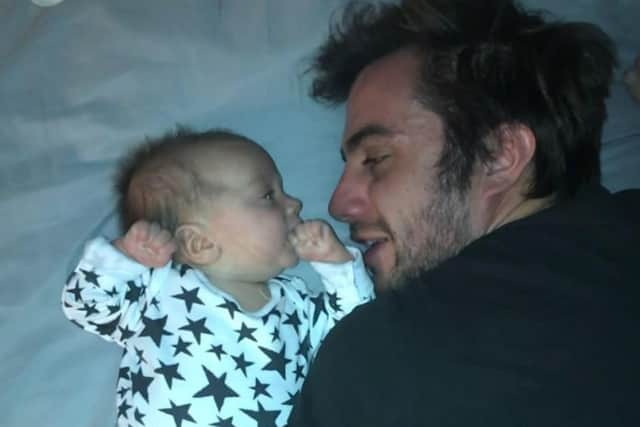

They claimed not to have been informed by the police control room that a witness had seen Richard on the wrong side of the railings at the viewpoint.
PC Hussain told the court he “didn’t really have any concerns” at that stage.
In footage from the officers’ body-worn camera, Richard confirmed that he had drunk four shots of whiskey.
Advertisement
Hide AdAdvertisement
Hide AdPC Hussain said that Richard did not appear to be under the influence of alcohol - adding that he was holding a conversation and responding to questions.
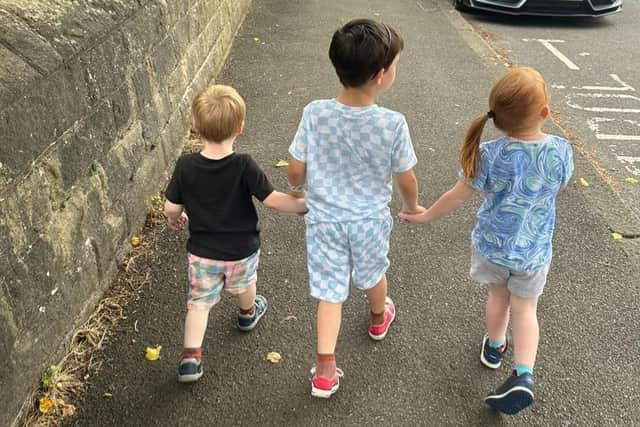

After being told by electrician Richard that he was feeling down but not having thoughts of suicide the officers left the 34-year-old at High Tor as he said he “wanted to stay a bit longer and have some time to himself.”
The pair drove to Richard’s home and while there a radio call came in, calling all units to reports of an incident at High Tor - and both officers ran from the house.
Police recordings showed while en-route to the scene after Richard had fallen to his death, PC Gibson said “oh mate, we’re going to get f****** ripped apart”.
Advertisement
Hide AdAdvertisement
Hide AdA post-mortem report found that Richard had suffered multiple life-threatening injuries and was pronounced dead at the scene.
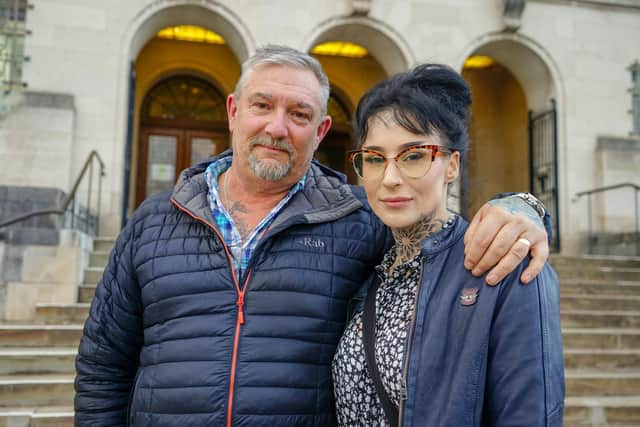

Speaking after the inquest about the events of June 9, 2020, Danielle and her father David feel they have been “failed” by Derbyshire Police.
Danielle, 35, said: “I feel we were let down not just by those two officers, it was by the force. There's more than one area where it went wrong.”
During the inquest it has emerged that Derbyshire Police have no way of saying for sure whether the two officers at the scene of Richard’s death received the vital information about his position on the cliff edge prior to their arrival.
Advertisement
Hide AdAdvertisement
Hide AdSpeaking about that, Danielle said: “Surely no officers attend a situation without knowing why they’re attending the situation. They’ve got to have some details, haven’t they.
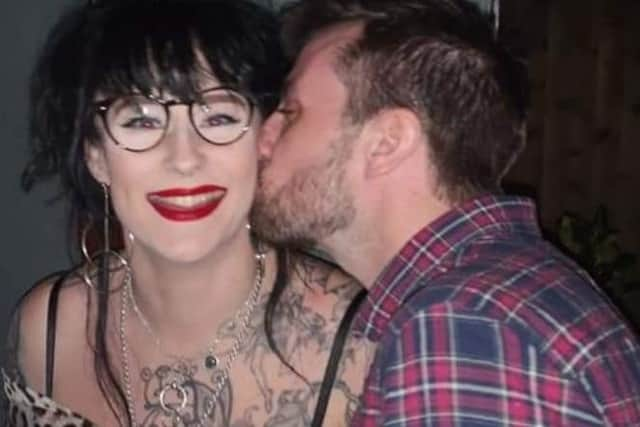

“There was a call from the public of concern - they attended the situation as an emergency.
“How can you attend anything without wondering what you’re attending for.”
David, 59, said: “The one thing we’ve said from day one over the last three years is somebody should have stayed with him while they rang Danielle.
Advertisement
Hide AdAdvertisement
Hide Ad“The main thing is we do not feel that he should have been left. His death could have been avoided.
“The lady that rang in could see there was a dangerous situation, so why did two police officers leave him in that dangerous situation?
“A member of the public can see that there’s potential for something going catastrophically wrong. Why did they leave him there?”
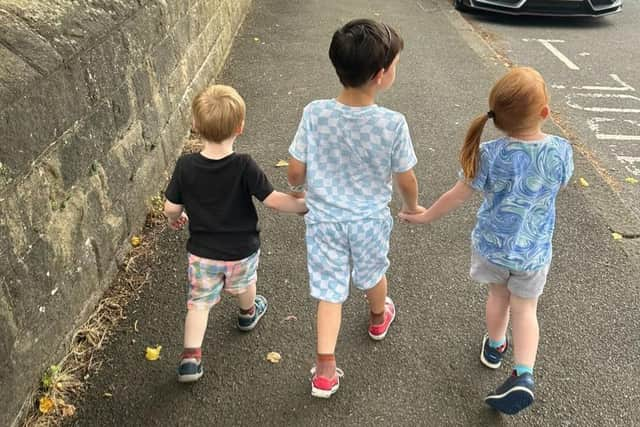

During the inquest it was heard that the two PCs had no powers under Section 136 of the Mental Health Act to detain Richard as his “presentation” was not such that he was suffering from a “mental disorder”.
Advertisement
Hide AdAdvertisement
Hide AdFurther possible actions the officers could have taken were also identified.
They included asking another officer to attend Richard’s home address or agree that one of them would remain with him while the other attended his Matlock home.
However, the inquest heard it was possible no other officers would have been available.
While the two PCs did consult a mental health triage about Richard, this was merely to ascertain whether he was known to services and his “presentation” on the cliff was not discussed.
Advertisement
Hide AdAdvertisement
Hide AdDanielle added: “I think the consequences of the police doing something wrong on their part would have been a lot less catastrophic than Richard dying and my family being blown to pieces and my children ending up without a dad.”
Danielle and Richard first met at Highfields School in Matlock - but it was not until 2017 that they became a couple after meeting up at a bar where Danielle was working.
After Danielle helped a very tipsy Richard get safely home in a taxi one night the pair began exchanging messages,
It was at Christmas 2017 when the pair found out that they were expecting their first child Dylan, and Danielle said that, although Richard was “very shocked”, he was “over the moon” to find out that she was pregnant.
Advertisement
Hide AdAdvertisement
Hide AdIvy, now aged three and Jaxon, aged two, followed thereafter.
Danielle said that she endured a “rocky pregnancy”, but that Richard was “very supportive” throughout - and that he “took to being a dad like a duck to water.”
Richard was described as “so happy and laid back” - and Danielle added that his “constant reply” of “it’ll be reyt” was something that he said to everyone.
In the weeks leading up to his death Richard had taken out two £1,000 loans while struggling financially due to problems with furlough pay - and that this was “obviously something that worried him.”
Advertisement
Hide AdAdvertisement
Hide AdSpeaking after the inquest, Danielle said: “I didn’t know about his furlough payments until really close to the time - I assumed he was being paid his normal pay from furlough and it turned out he wasn’t.”
However, around the same time Danielle had discovered she was pregnant with their third child, Jaxon, and, having a history of high-risk pregnancies, Richard’s strategy was to make sure she was “calm and chilled”.
At the time of Richard’s death his eldest son Dylan was 22 months old.
Describing the father and son as “best mates”, Danielle said: “His little world was blown to pieces overnight.
Advertisement
Hide AdAdvertisement
Hide Ad“He asked a lot where daddy was and stood at the back door every night shouting ‘daddy’, ‘where’s my daddy?’ He stood on the step and did that for…he still does.
“It broke his heart, it turned him upside down. He suffered terribly with separation anxiety and developed a severe stammer through delayed trauma response.
“He still asks about his dad every day. This week he’s been asking ‘are you going to court to fight for daddy?’ and wants to know why the police officers didn’t help his daddy.
“The love and support he gets is huge but it’s not his dad and that’s something that I feel was taken away from him.”
Advertisement
Hide AdAdvertisement
Hide AdCoroner Peter Nieto, who gave an open conclusion at Richard’s inquest, said notes left by Richard and empty strips of powerful painkiller amitriptyline suggested he had “contemplated” suicide, however he was “not confident” that the father-of-three intended to take his own life.
He added it was possible the combination of alcohol and prescription drugs – taken by Richard in the fortnight prior to his death for shoulder pain – had affected his coordination.
Also, evidence from witness Donna Hawkins as to whether Richard had “purposefully” gone over the ledge was “ambiguous”, said Mr Nieto.
Giving evidence during the inquest PC Abaid Hussain added said he “genuinely” did not consider Richard as “being at risk” at this stage - and if he had, he would have had no hesitation in contacting a supervisor.
Advertisement
Hide AdAdvertisement
Hide AdWhen discussing his reflections upon the incident, PC Hussain said that he would now consider different approaches. These included leaving an officer with Richard, so that another could go and speak to Danielle, or possibly trying to contact Danielle while remaining at High Tor with Richard.
PC Eden Gibson disagreed with PC Hussain - stating that she would not leave an officer alone at the scene.
She said that contacting Danielle while remaining with Richard was an option, but low staffing numbers meant they had no option to send a third officer to attend Danielle’s address that day.
Joanne Caffrey, who worked as a police officer for 23 years before moving into specialist police training, said if police call handlers did have the information that Richard was spotted on the wrong side of the railing, she would expect that to be passed onto the responding officers - adding that this was a “significant red flag.”
Advertisement
Hide AdAdvertisement
Hide AdShe said that, had this information been shared, it should have prompted further questioning of Richard from PC Hussain and PC Gibson.
Probationary officers would usually have had around three hours of mental health training, said Ms Caffrey, which covered the overt signs and symptoms of mental health conditions.
She added that the closed questions put to Richard were signs of “inexperience”, and that longer-serving officers would be more comfortable asking open questions.
At the conclusion of the inquest coroner Peter Nieto said he did not find “any contributory acts or omissions by the police service” in respect of Richard’s death.
Advertisement
Hide AdAdvertisement
Hide AdMr Nieto said it was possible the radio call sent by the control room that Richard had been seen over the railing at the viewpoint may have been “unclear or not fully heard” by PCs Hussain and Gibson.
He said: “While there’s uncertainty it’s accepted by police that this information was very important and should have been fully assessed.”
The coroner added: “It’s accepted that this knowledge would have changed the approach of the officers - they would have asked more probing questions.
“But I cannot find it would have substantially changed the course of events - when he was seen by officers he was on the correct side of the railings and what Richard’s response would have been to probing questions cannot be known.”
Advertisement
Hide AdAdvertisement
Hide AdMr Nieto said: “It would have been an option to speak to a supervisor. In retrospect that would have been a good idea in view of their (the attending officers’) inexperience.”
Richard, said the coroner, was not presenting a “clear and immediate risk” as he was “back inside a safe area” when police encountered him.
Mr Nieto said it was still “unclear” whether or not the “key” information about Richard being seen outside the railings had been received by the officers.
A barrister representing Richard’s partner Danielle said: “On a basic level there has to be confirmation by officers that messages have been passed on.”
Advertisement
Hide AdAdvertisement
Hide AdSpeaking about the need for inexperienced officers to seek advice from supervisors in cases such as Richard’s, she added: “The family would be interested to know whether there are safeguards in place.”
Mr Nieto told the inquest he would write to Derbyshire Police, raising the above points, and request a response by the end of January.
DCC Simon Blatchly of Derbyshire Police said: “The thoughts of everyone in the force remain with Mr Askew’s loved ones – as they have since this most tragic of incidents occurred.
"We will review any learnings that have arisen from this inquest to help improve our response to these types of incidents and we will respond to the Coroner’s letter within the timeframe set out.”
If you need support call Samaritans on 116 123 or go to https://www.samaritans.org/how-we-can-help/contact-samaritan/